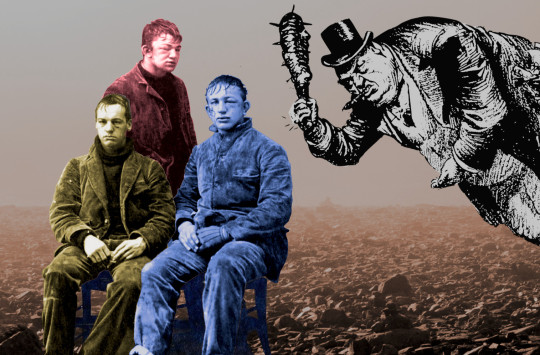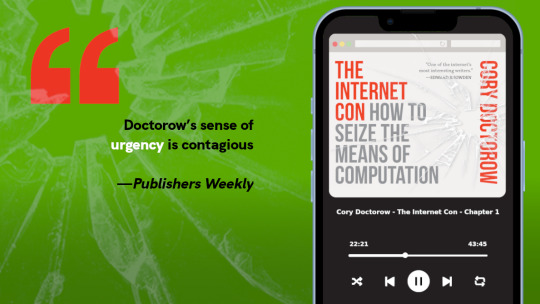#patrick mckenzie
Explore tagged Tumblr posts
Text
Paying consumer debts is basically optional in the United States

The vast majority of America's debt collection targets $500-2,000 credit card debts. It is a filthy business, operated by lawless firms who hire unskilled workers drawn from the same economic background as their targets, who routinely and grotesquely flout the law, but only when it comes to the people with the least ability to pay.
America has fairly robust laws to protect debtors from sleazy debt-collection practices, notably the Fair Debt Collection Practices Act (FDCPA), which has been on the books since 1978. The FDCPA puts strict limits on the conduct of debt collectors, and offers real remedies to debtors when they are abused.
But for FDPCA provisions to be honored, they must be understood. The people who collect these debts are almost entirely untrained. The people they collected the debts from are likewise in the dark. The only specialized expertise debt-collection firms concern themselves with are a series of gotcha tricks and semi-automated legal shenanigans that let them take money they don't deserve from people who can't afford to pay it.
There's no better person to explain this dynamic than Patrick McKenzie, a finance and technology expert whose Bits About Money newsletter is absolutely essential reading. No one breaks down the internal operations of the finance sector like McKenzie. His latest edition, "Credit card debt collection," is a fantastic read:
https://www.bitsaboutmoney.com/archive/the-waste-stream-of-consumer-finance/
McKenzie describes how a debt collector who mistook him for a different PJ McKenzie and tried to shake him down for a couple hundred bucks, and how this launched him into a life as a volunteer advocate for debtors who were less equipped to defend themselves from collectors than he was.
McKenzie's conclusion is that "paying consumer debts is basically optional in the United States." If you stand on your rights (which requires that you know your rights), then you will quickly discover that debt collectors don't have – and can't get – the documentation needed to collect on whatever debts they think you owe (even if you really owe them).
The credit card companies are fully aware of this, and bank (literally) on the fact that "the vast majority of consumers, including those with the socioeconomic wherewithal to walk away from their debts, feel themselves morally bound and pay as agreed."
If you find yourself on the business end of a debt collector's harassment campaign, you can generally make it end simply by "carefully sending a series of letters invoking [your] rights under the FDCPA." The debt collector who receives these letters will have bought your debt at five cents on the dollar, and will simply write it off.
By contrast, the mere act of paying anything marks you out as substantially more likely to pay than nearly everyone else on their hit-list. Paying anything doesn't trigger forbearance, it invites a flood of harassing calls and letters, because you've demonstrated that you can be coerced into paying.
But while learning FDCPA rules isn't overly difficult, it's also beyond the wherewithal of the most distressed debtors (and people falsely accused of being debtors). McKenzie recounts that many of the people he helped were living under chaotic circumstances that put seemingly simple things "like writing letters and counting to 30 days" beyond their needs.
This means that the people best able to defend themselves against illegal shakedowns are less likely to be targeted. Instead, debt collectors husband their resources so they can use them "to do abusive and frequently illegal shakedowns of the people the legislation was meant to benefit."
Here's how this debt market works. If you become delinquent in meeting your credit card payments ("delinquent" has a flexible meaning that varies with each issuer), then your debt will be sold to a collector. It is packaged in part of a large spreadsheet – a CSV file – and likely sold to one of 10 large firms that control 75% of the industry.
The "mom and pops" who have the other quarter of the industry might also get your debt, but it's more likely that they'll buy it as a kind of tailings from one of the big guys, who package up the debts they couldn't collect on and sell them at even deeper discounts.
The people who make the calls are often barely better off than the people they're calling. They're minimally trained and required to work at a breakneck pace. Employee turnover is 75-100% annually: imagine the worst call center job in the world, and then make it worse, and make "success" into a moral injury, and you've got the debt-collector rank-and-file.
To improve the yield on this awful process, debt collection companies start by purging these spreadsheets of likely duds: dead people, people with very low credit-scores, and people who appear on a list of debtors who know their rights and are likely to stand on them (that's right, merely insisting on your rights can ensure that the entire debt-collection industry leaves you alone, forever).
The FDPCA gives you rights: for example, you have the right to verify the debt and see the contract you signed when you took it on. The debt collector who calls you almost certainly does not have that contract and can't get it. Your original lender might, but they stopped caring about your debt the minute they sold it to a debt-collector. Their own IT systems are baling-wire-and-spit Rube Goldberg machines that glue together the wheezing computers of all the companies they've bought over the last 25 years. Retrieving your paperwork is a nontrivial task, and the lender doesn't have any reason to perform it.
Debt collectors are bottom feeders. They are buying delinquent debts at 5 cents on the dollar and hoping to recover 8 percent of them; at 7 percent, they're losing money. They aren't "large, nationally scaled, hypercompetent operators" – they're shoestring operations that can only be viable if they hire unskilled workers and fail to train them.
They are subject to automatic damages for illegal behavior, but they still break the law all the time. As McKenzie writes, a debt collector will "commit three federal torts in a few minutes of talking to a debtor then follow up with a confirmation of the same in writing." A statement like "if you don’t pay me I will sue you and then Immigration will take notice of that and yank your green card" makes the requisite three violations: a false threat of legal action, a false statement of affiliation with a federal agency, and "a false alleged consequence for debt nonpayment not provided for in law."
If you know this, you can likely end the process right there. If you don't, buckle in. The one area that debt collectors invest heavily in is the automation that allows them to engage in high-intensity harassment. They use "predictive dialers" to make multiple calls at once, only connecting the collector to the calls that pick up. They will call you repeatedly. They'll call your family, something they're legally prohibited from doing except to get your contact info, but they'll do it anyway, betting that you'll scrape up $250 to keep them from harassing your mother.
These dialing systems are far better organized than any of the company's record keeping about what you owe. A company may sell your debt on and fail to keep track of it, with the effect that multiple collectors will call you about the same debt, and even paying off one of them will not stop the other.
Talking to these people is a bad idea, because the one area where collectors get sophisticated training is in emptying your bank account. If you consent to a "payment plan," they will use your account and routing info to start whacking your bank account, and your bank will let them do it, because the one part of your conversation they reliably record is this payment plan rigamarole. Sending a check won't help – they'll use the account info on the front of your check to undertake "demand debits" from your account, and backstop it with that recorded call.
Any agreement on your part to get on a payment plan transforms the old, low-value debt you incurred with your credit card into a brand new, high value debt that you owe to the bill collector. There's a good chance they'll sell this debt to another collector and take the lump sum – and then the new collector will commence a fresh round of harassment.
McKenzie says you should never talk to a debt collector. Make them put everything in writing. They are almost certain to lie to you and violate your rights, and a written record will help you prove it later. What's more, debt collection agencies just don't have the capacity or competence to engage in written correspondence. Tell them to put it in writing and there's a good chance they'll just give up and move on, hunting softer targets.
One other thing debt collectors due is robo-sue their targets, bulk-filing boilerplate suits against debtors, real and imaginary. If you don't show up for court (which is what usually happens), they'll get a default judgment, and with it, the legal right to raid your bank account and your paycheck. That, in turn, is an asset that, once again, the debt collector can sell to an even scummier bottom-feeder, pocketing a lump sum.
McKenzie doesn't know what will fix this. But Michael Hudson, a renowned scholar of the debt practices of antiquity, has some ideas. Hudson has written eloquently and persuasively about the longstanding practice of jubilee, in which all debts were periodically wiped clean (say, whenever a new king took the throne, or once per generation):
https://pluralistic.net/2020/03/24/grandparents-optional-party/#jubilee
Hudson's core maxim is that "debt's that can't be paid won't be paid." The productive economy will have need for credit to secure the inputs to their processes. Farmers need to borrow every year for labor, seed and fertilizer. If all goes according to plan, the producer pays off the lender after the production is done and the goods are sold.
But even the most competent producer will eventually find themselves unable to pay. The best-prepared farmer can't save every harvest from blight, hailstorms or fire. When the producer can't pay the creditor, they go a little deeper into debt. That debt accumulates, getting worse with interest and with each bad beat.
Run this process long enough and the entire productive economy will be captive to lenders, who will be able to direct production for follies and fripperies. Farmers stop producing the food the people need so they can devote their land to ornamental flowers for creditors' tables. Left to themselves, credit markets produce hereditary castes of lenders and debtors, with lenders exercising ever-more power over debtors.
This is socially destabilizing; you can feel it in McKenzie's eloquent, barely controlled rage at the hopeless structural knot that produces the abusive and predatory debt industry. Hudson's claim is that the rulers of antiquity knew this – and that we forgot it. Jubilee was key to producing long term political stability. Take away Jubilee and civilizations collapse:
https://pluralistic.net/2022/07/08/jubilant/#construire-des-passerelles
Debts that can't be paid won't be paid. Debt collectors know this. It's irrefutable. The point of debt markets isn't to ensure that debts are discharged – it's to ensure that every penny the hereditary debtor class has is transferred to the creditor class, at the hands of their fellow debtors.
In her 2021 Paris Review article "America's Dead Souls," Molly McGhee gives a haunting, wrenching account of the debts her parents incurred and the harassment they endured:
https://www.theparisreview.org/blog/2021/05/17/americas-dead-souls/
After I published on it, many readers wrote in disbelief, insisting that the debt collection practices McGhee described were illegal:
https://pluralistic.net/2021/05/19/zombie-debt/#damnation
And they are illegal. But debt collection is a trade founded on lawlessness, and its core competence is to identify and target people who can't invoke the law in their own defense.

Going to Defcon this weekend? I’m giving a keynote, “An Audacious Plan to Halt the Internet’s Enshittification and Throw it Into Reverse,” today (Aug 12) at 12:30pm, followed by a book signing at the No Starch Press booth at 2:30pm!
https://info.defcon.org/event/?id=50826


I’m kickstarting the audiobook for “The Internet Con: How To Seize the Means of Computation,” a Big Tech disassembly manual to disenshittify the web and bring back the old, good internet. It’s a DRM-free book, which means Audible won’t carry it, so this crowdfunder is essential. Back now to get the audio, Verso hardcover and ebook:
http://seizethemeansofcomputation.org

If you’d like an essay-formatted version of this post to read or share, here’s a link to it on pluralistic.net, my surveillance-free, ad-free, tracker-free blog:
https://pluralistic.net/2023/08/12/do-not-pay/#fair-debt-collection-practices-act
#pluralistic#jubilee#debts that cant be paid wont be paid#Patrick McKenzie#patio11#bits about money#debt#debt collection#do not pay#bottom feeders#Fair Debt Collection Practices Act#fdcpa#finance#armbreakers
11K notes
·
View notes
Text
Can any world survive a benevolent god?
@foggyoutline presents:

Cover art by Dionysis Livanis
Produced by @wirelesstheatre
In this original audio drama podcast, each episode is a prayer, some prayers are answered, and a prayer granted can upend the world.
For fans of




Each episode of I Need A Miracle is a short monologue. A new character every episode. Never the same character twice. Always addressing a plea to a listening deity – which never makes a sound.
Play god
You, the listener, stand in for a silently listening god. Hear brazen demands for divine intervention and vulnerable, secret pleas for deliverance. Whose requests would you grant and why? Does anyone deserve a miracle?
Play detective
Which pleas are granted? How does the listening being decide? What are the Upheavals that regularly wrack this world? What threatens to rise from the Depths? And can any being with ultimate power truly be benevolent?
Play the heartstrings
I Need A Miracle is all about the many kinds of wanting, and the many ways of asking for help. How would you make your case to an omnipotent being who grants some miracles but not others, based on ineffable criteria?
Coming August 2024
Stay tuned for trailers, release dates and more:
here on tumblr by following @inyourbenevolence
(you can also follow writer @merelymatt, producers @wirelesstheatre and publishers @foggyoutline for completism)
on instagram @ in.your.benevolence
And find cast and crew credits at the show homepage:
#i need a miracle#miraclepod#foggy outline#wireless theatre#dionysis livanis#audio drama#fiction podcast#coming soon#fiction podcast announcement#audio drama announcement#podcast launch#audio drama launch#monologue#unseen#within the wires#i am in eskew#the goblet wire#sff#alternate universe#secondary world#annette badland#nathan blades#saffron coomber#dédé davi#robyn holdaway#david holt#patrick mckenzie#harry myers#caleb obediah#lizzie waterworth
33 notes
·
View notes
Text
Many, many crimes involve lies, but most lies told are not crimes and most lies told are not recorded for forever. We did, however, make a special rule for lies told to banks: they’re potentially very serious crimes and they will be recorded with exacting precision, for years, by one of the institutions in society most capable of keeping accurate records and most findable by agents of the state. This means that if your crime touches money, and much crime is financially motivated, and you get beyond the threshold of crime which can be done purely offline and in cash, you will at some point attempt to interface with the banking system. And you will lie to the banks, because you need bank accounts, and you could not get accounts if you told the whole truth. The government wants you to do this. Their first choice would be you not committing crimes, but contingent on you choosing to break the law, they prefer you also lie to a bank.
-Patrick McKenzie
25 notes
·
View notes
Text
Why tolerate shenanigans? Some shenanigans are necessary to keep the world spinning.
Patrick McKenzie, Bits about Money
3 notes
·
View notes
Text
youtube
0 notes
Text

Like Minds | 2006
#moodboard#like minds#like minds 2006#tom sturridge#eddie redmayne#toni collette#martin mckenzie#patrick malahide#amit shah#jon overton#movies#loved it#give me more
109 notes
·
View notes
Text





Favorite Angela Moments 59/∞: Starpunch
Prime! The Amazon Musical
This is like a preview for the musical since they've only performed for a live audience so far - it looks promising ~ they did the opening number
Mary Lou and Nikki singing together? Angela in shorts? All while doing a commentary on the horrible environmental impact and working conditions at Amazon? Yes please.
Patrick doing a whole number? Hell yeah!
Chanse is Alexa? His voice is soooo smooth.
Can't wait til they do a livestream for this
Mamma Mia But Different (Abbalachia Edition)
They did the musical's final number - Winner Takes It All
A mainly Mary Lou solo where she plays a game to take her family back
Angela as the one woman band
Vic in that Trooper outfit + Jon in suspenders
Highlight was when Mary Lou forgot the lyrics and absolutely no one helped her. Jon and Kimia were dying laughing in the background (She's consfused!) , Vic was stuck in the middle with ML mumbling and trying not to laugh, and ML looking at Angela for help but seems like no one remembered the lines so Ang was just playing guitar for 40 seconds until ML found her way back into the song.
Note: I still haven't made the whole set for this because whenever I try, I just end up watching the whole thing again, lol. I will get to it eventually.
#this post is from october#im trying to get rid of drafts while im busy#angela giarratana#chanse mccrary#patrick mcdonald#vic michaelis#jon matteson#kimia behpoornia#mary lou#emily skeggs#nikki mckenzie#smosh#dropout#starkid#team starkid#moon goon#miscanggifs#anggifs#mamma mia but different#prime amazon musical
45 notes
·
View notes
Text

#tv shows#tv series#polls#the 4400#jacqueline mckenzie#patrick john flueger#joel gretsch#2000s series#us american series#have you seen this series poll
53 notes
·
View notes
Text










is this anything
[1] [2] [3] [4] [5]
#bbc casualty#rida amaan#cam mickelthwaite#siobhan mckenzie#patrick onley#charlie fairhead#tariq hussein#rash masum#ryan firth#sah brockner#teddy gowan#will noble#stevie nash#brother it was a fucking struggle trying to remember half these peoples surnames jesus fucking christ#anyway#somebody made a post saying stop apologising for spamming the tag and starts spamming the tag more so#i took that as a challenge#teehee#motley don't look#u don't like this show
32 notes
·
View notes
Text






Some Track and Field with the husband…
Or: I think Jake McKenzie is so annoying about being married.
Like he cannot get through one (1) conversation without mentioning his husband. And he’s so happy when he remembers it as well. „Wow I actually got someone that will love me forever.“ (sobs)
This actually makes me think about how he’d react to ‚I hate my wife jokes‘ 💀 … Can you tell I have brainworms about this guy???? Because I do. I really do.
Patrick is not much better tho. Slay Patrick. If I was married to Jake I would also never think about anyone else-
(This is the Endless ending btw. Like ehhh 2? years post canon and these two fools have not become any less danger prone)
(Also ponytail <3)
#choices stories you play#endless summer#mc x jake#jake mckenzie#Jake x Patrick#endless summer choices#fan comic#idiot gays
9 notes
·
View notes
Text
the way siobhan stood up to patrick was sooooo iconic yes girl
12 notes
·
View notes
Text
Patrick McKenzie has a new podcast
Patrick "patio11" McKenzie has a new podcast, and his first episode is a conversation with Ricki Heicklen that, while being 1 hour and 40 minutes, still manages to be one of the most information-dense podcast episodes I have listened to the past year, and possibly ever.
There is too much to summarize in one post, and the episode is too ranging in scope for a short quote to be representative, but here's a bit that tickled my brain:
Planes are very easy to track on the internet for various reasons that have more to do with aviation than anything else. Some people travel by private planes, and those private planes are registered to them. If a CEO routinely flies to a particular place that only has one interesting business, it is highly likely that there is a deal happening there, and most frequently that deal might be "I'm attempting to acquire this interesting business." And so, people will get an extremely commercially significant bit of information out of something which is 1) legally required, 2) absolutely anodyne, and 3) does not on its surface look like inside information at all, because it isn't inside information; it's open source.
7 notes
·
View notes
Text
In your benevolence,
hear the Rebel's plea that you confirm our suspicions.
The series finale of I Need A Miracle is out now. Search for I Need A Miracle in podcast apps or head to foggyoutline.com/ineedamiracle for all the ways to listen.
Starring Patrick McKenzie as Arx, the Rebel
Written by @merelymatt
Directed by Robert Valentine
Recorded by Stephen H at Jukebox Studios
With broadcast assistance from Teresa Milewski
Sound design by Sarah Buchynski
Music by Katharine Seaton
Produced by Sarah Golding for @wirelesstheatreco and @foggyoutline
Cover art by Dionysis Livanis
#i need a miracle#miraclepod#patrick mckenzie#the rebel#series finale#season finale#matt boothman#robert valentine#jukebox studios#teresa milewski#sarah buchynski#polarity audio works#katharine seaton#sarah golding#wireless theatre#foggy outline#audio drama#podcast#Spotify#new episode notice
5 notes
·
View notes
Text
Reno, directed by John Farrow. (1939; Atlanta, GA: Turner Entertainment Company, 2014), DVD.
#reno 1939#richard dix#as 'william shayne'#gail patrick#as 'jessie'#astrid allwyn#as 'flora mckenzie kane'#joyce compton#as 'mrs. newcomb'#rko film#rko feature film
3 notes
·
View notes
Text
Binance also operated in the state of Heisenbergian uncertainty, sometimes known as Malta. Malta has a substantial financial services industry, which welcomed Binance with open arms in 2018 and then pretended not to know him in 2020. This continues Malta’s proud tradition of strategic ambiguity as to whether it is an EU country or rentable skin suit for money launderers. ¿Por qué no los dos? Despite this, Binance would continue claiming to customers and other regulators for a while that it was fully authorized to do business by Malta.
Patrick McKenzie, Bits about Money
#quote#quotation#Patrick McKenzie#Bits about Money#Binance#(I put this in the tags with some trepidation)#Heisenbergian uncertainty#Malta#financial services industry#strategic ambiguity#country#skin suit#see also: Cyprus#customers#regulators#money laundering
2 notes
·
View notes
Text
youtube
Mind Eraser by Nicole Atkins from the album Italian Ice - Video by Big Howl
#music#nicole atkins#jeremy ferguson#ben tanner#david moose sherman#david hood#chris colbert#mckenzie smith#jim sclavunos#carl broemel#binky griptite#spooner oldham#dexter green#britt daniel#kelvin holly#todd beene#music video#drew saracco#patrick nugent#ali ciotto#big howl#video#Youtube
25 notes
·
View notes